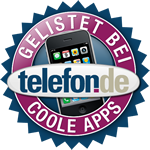Der Vortrag über Mobile Learning an der TU Wien im Rahmen der e-Learning Impulse steht nun als Podcast zur Verfügung. Die Folien wurden bereits hier [Link] veröffentlicht. Viel Spaß beim Anhören und Feedback ist immer willkommen 🙂 .
[presentation] Mobile Learning – who needs it?
Im Rahmen der E-Learning Impulse der TU Wien wurde ich gebeten über unsere Mobile-Learning-Aktivitäten zu berichten – hier also die Folien meines Vortrags zum Thema:
Klicken Sie auf den unteren Button, um den Inhalt von www.slideshare.net zu laden.
[iPhone App] iOJS – L3T am iPhone
 Die iPhone App iOJS hat ein grafisches Update und weitere kleine Verbesserungen erhalten. Das Ergbnis ist ab sofort im App Store iTunes verfügbar und kann frei heruntergeladen werden. Damit kann man nicht nur L3T am iPhone lesen, sondern auch die Artikel anderen Open Journal Systeme die über das entsprechende Plugin verfügen.
Die iPhone App iOJS hat ein grafisches Update und weitere kleine Verbesserungen erhalten. Das Ergbnis ist ab sofort im App Store iTunes verfügbar und kann frei heruntergeladen werden. Damit kann man nicht nur L3T am iPhone lesen, sondern auch die Artikel anderen Open Journal Systeme die über das entsprechende Plugin verfügen.
The iOJS app allows the user to store his favorite OJS journals into his iPhone. The user can then browser through all the issues and articles published by the journal, and download the attached files to directly read them on his iPhone.
Furthermore, it is possible to directly send comments on articles to the server, if the user has a valid registration on the OJS server. For this to work, the OJS server has to install the iPhoneGatewayPlugin which is included in the application and doesn’t need any configuration.
Hier kann die App downgeloadet werden [Link] und alle weiteren verfügbaren Apps der TU Graz findet man hier [iTunes Link].
[bachelorthesis] Business models for mobile Applications
Another bachelor thesis of our department adresses the questions which business models are appropriate for mobile Applications. Enjoy the interesting work of Richard and Feedback is appreciated 🙂 .
Abstract:
In the mobile space are countless financial successful applications and every one of these is backed up by a business model. A business model defines how technology, strategy and organization work together and how to achieve maximal possible financial success. This thesis will present common business models that are used in the mobile space. The business models illustrated are very varying from classic sale to indirect advertising models. The Apple App Store is used as environment to describe and analyze the models. The thesis also contains one case study of a successful application. It shows the evolution of the application and necessary changes
to adapt to new market challenges.
Klicken Sie auf den unteren Button, um den Inhalt von www.scribd.com zu laden.
[bachelorthesis] iPad E-Book Reader Application
Die iPad-App von L3T haben wir bereits erfolgreich im App-Store untergebracht [Link]. Jetzt gibt es noch die zugehörige schriftliche Ausarbeitung zum Nachlesen, darin sind nicht nur die Funktionalitäten, sondern auch der technische Background beschrieben:
Klicken Sie auf den unteren Button, um den Inhalt von www.scribd.com zu laden.
[recording] Ist in Zukunft ein Lehrbuch noch ein Buch?
Im Rahmen der iUNIG Veranstaltung „Hochschule in Print“ konnte ich meine Gedanken zur Zukunft des Lehrbuchs darstellen. Die Folien selbst sind als iPad-App erhältlich [Vortrag als iPad App]
Klicken Sie auf den unteren Button, um den Inhalt von curry.tugraz.at zu laden.
Alle weiteren Vorträge sind ebenfalls auf der Webseite zugänglich.
[Android App] 1×1 Trainer
 Nach der iPhone App ist nun auch die Android App für unser Einmaleins Spiel im Android Market erhältlich. Das Besondere an der App ist, dass diese die Aufgaben infolge des Lernfortschrittes stellt.
Nach der iPhone App ist nun auch die Android App für unser Einmaleins Spiel im Android Market erhältlich. Das Besondere an der App ist, dass diese die Aufgaben infolge des Lernfortschrittes stellt.
Der 1×1-Trainer ist ein Lernprogramm für Kinder, die gerade das 1×1 lernen.
Es gibt zwei Arten zu spielen:
Beim Trainer musst du dir einen Account erstellen, danach werden alle gerechneten Beispiele online gespeichert und der Lernfortschritt kann so verfolgt werden.
Das Speedgame bietet dir die Möglichkeit, dein Können in einem kurzen, 20 Beispiele umfassenden Spiel unter Beweis zu stellen. Umso besser du abschneidest, desto besser wird deine Punktezahl ausfallen!
Diese App bietet den Spielern eine lustige und trotzdem effiziente Lernerfahrung, motiviert sie besser zu werden und hält Frustration minimal!
Viel Spaß!
[App of the Week] L3T E-Book
 Das L3T E-Book wurde von der Webseite telefonde mit der Auszeichnung App der Woche prämiert. Es freut uns, dass die App so gut ankommt und nehmen auch Feedback auf, was in einer nächsten Version eventuell verändert gehört.
Das L3T E-Book wurde von der Webseite telefonde mit der Auszeichnung App der Woche prämiert. Es freut uns, dass die App so gut ankommt und nehmen auch Feedback auf, was in einer nächsten Version eventuell verändert gehört.
[publication] A Qualitative Approach towards Discovering Microblogging Practices of Scientists
Our this year publication on „A Qualitative Approach towards Discovering Microblogging Practices of Scientists“ for ICL 2011 conference is now online avaible as Draft version. The slides were already published here.
Abstract:
Although Microblogging (for instance Twitter) is still rather young compared to other traditional weblogging services there already exists quite a number of studies on itsusage. The majority of scholars dealing with this topic have chosen a quantitative approach focusing on different aspects such as publishing patterns, follower patterns, publishing practices, etc. However, there are less qualitative evidence and case studies on how Twitter is used by adults in their personal working practices. This paper presents a qualitative approach of discovering microblogging practices and obtaining rich descriptions of few cases that give a deeper insight into how Twitter isused by scientists and how this practice shapes their social networks. The methodological approach is based on online ethnographic studies. ThereforeGrabeeter, a tool for collecting all public tweets of a person in various formats, hasbeen adapted in order to obtain the data appropriate for a qualitative analysis following a grounded theory approach. After an analysis of the current state-of-the-art we will outline an approach for a more qualitative analysis that focuses on discovering tacit aspects of microblogging practices such as value or purpose. Finally some initial results from four individual cases will be discussed. This work presentsthe initial phase of a detailed qualitative approach towards exploring microblogging practices of scientists.
Klicken Sie auf den unteren Button, um den Inhalt von www.scribd.com zu laden.
Reference: Ebner, M.; Kieslinger, B. (2011), A Qualitative Approach towards Discovering Microblogging Practices of Scientists, – in: 14th International Conference on Interactive Collaborative Learning (ICL2011) ̶ 11th International Conference Virtual University (vu’11). (2011), p. 51 – 57
[AppOfTheWeek] L3T E-Book is nominiert
 Es freut uns sehr, dass die iPad App des L3T Ebooks bei Telefon.de für die Auszeichnung „App der Woche“ nominiert wurde. Nun bitten wir darum, dass ihr die App fleißig bewertet und eure Meinung abgeht. Danke und wir freuen uns sehr auf euer Feedback.
Es freut uns sehr, dass die iPad App des L3T Ebooks bei Telefon.de für die Auszeichnung „App der Woche“ nominiert wurde. Nun bitten wir darum, dass ihr die App fleißig bewertet und eure Meinung abgeht. Danke und wir freuen uns sehr auf euer Feedback.
[Zur Bewertung]
